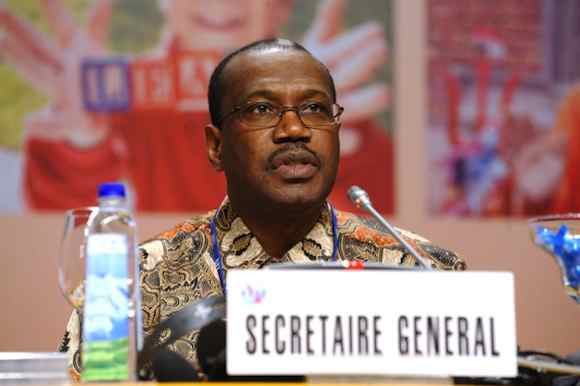This article is more than 1 year old
ITU Gen Sec: Why not speaking English can be a virtue
Talks linguistics and cross-border security with El Reg
Interview If you want to make money on the internet without paying America, your best bet is to refuse to speak English, according to the General Secretary of the International Telecommunication Union.
We sat down with Dr Hamadoun Touré in London, following publication of the ITU's report on the importance of broadband.

Touré: Forget Europe, it's America that takes the money
The International Telecommunication Union is a branch of the UN, but is actually older, having been set up in 1865 to coordinate communications infrastructure between countries.
These days it organises international standards, manages global allocations of radio spectrum and helps countries to achieve universal access to information. But while the ITU considers access to the internet to be a human right, it has no aspirations to governance of the internet itself.
As soon as he was elected General Secretary, last October, Dr Touré made it abundantly clear that the ITU is interested in ensuring the dumb pipes work, and has little interest in the data carried over them.
Speaking about the various internet governance bodies he reiterated that point "we are condemned to work together" he told us, admitting that there's often a clash of cultures but that this isn't necessarily a bad thing.
Putting the universal into broadband
Despite not running the internet the ITU is very interested in making sure it runs smoothly, and that governments don't get in the way of their citizens' unfettered access to communications.
Asked about the recent events in Egypt, where the government cut off internet, and cellular, communications Dr Touré becomes quite animated: "I was the first to condemn them ... the first on the phone," he tells us, explaining that cutting communication is the worst thing that a government under siege can do: "when [citizens] taste the freedom of the internet they won't give it back".
So cutting connections is always a bad thing, but most of the ITU's work is getting countries to embrace the value of universal broadband in the first place.
That isn't always easy, even with a jolly video, a 200-page argument and a catchy slogan ("Broadband. B More") the good doctor still spends most of his time telling government ministers, and businessmen, they can make money out of it too.
Government support is vital, and not just in keeping taxes on communications low, it can also play a vital role in ensuring that getting universal broadband doesn't just mean sending loads of cash to America.
When citizens taste the freedom of the internet they won't give it back
"Historically a country might decide to get a telephone network, so it puts in the infrastructure and then receives money from all the incoming calls made to that country (the termination rate).
But the internet doesn't work like that: a country that puts in internet infrastructure is more likely to see money pouring out as local ISPs have to pay peering partners to deliver content from Europe and America to their customers.
We put this point to Dr Touré, who pointed out how wrong we were: "Forget Europe, it's America that takes the money ... the content comes from America".
The best defence is, apparently, not to speak English, as the language barrier can give local content providers the vital advantage they need before Google et al take over.
But getting that local content off the ground requires governmental support – grants, enterprise zones and suchlike – which is often more difficult to procure than subsidies for infrastructure build out despite being equally important.
'Exemplary' UK
Perhaps worryingly the ITU considers the UK to be an exemplary model of how broadband deployment should work – driven by competitive, private, companies spurred on by light regulation with an emphasis on maintaining a competitive marketplace. It might not be perfect, but it's not at all bad.
Despite not being interested in internet governance, or the content carried, the ITU does expect to find a role in international law making and helping government adjust to a world where their citizens can set up "Facebook Republics" without them.
That means international treaties covering things such as IP tracing, enabling authorities in one country to track activity taking place in another, but such treaties will also have to cover what constitutes a crime and what should happen to anyone committing one.
On this Dr Touré is perhaps realistic when he says that such a treaty will take a decade or two to negotiate, but that the first steps have to be taken now to have something in place come 2031.
The ITU has always been about realising the value of the global telecommunications networks, but talking to its General Secretary, it becomes clear that the values it hopes to realise out of the internet go well beyond any financial return.
Money might be the driving motivation, and certainly what gets emphasised when selling connectivity to the developing world, but there's more than a trace of technical utopian about Dr Hamadoun Touré, who sees social and political change as an inevitable result of unrestricted access to information: and that might not be such a bad thing. ®
